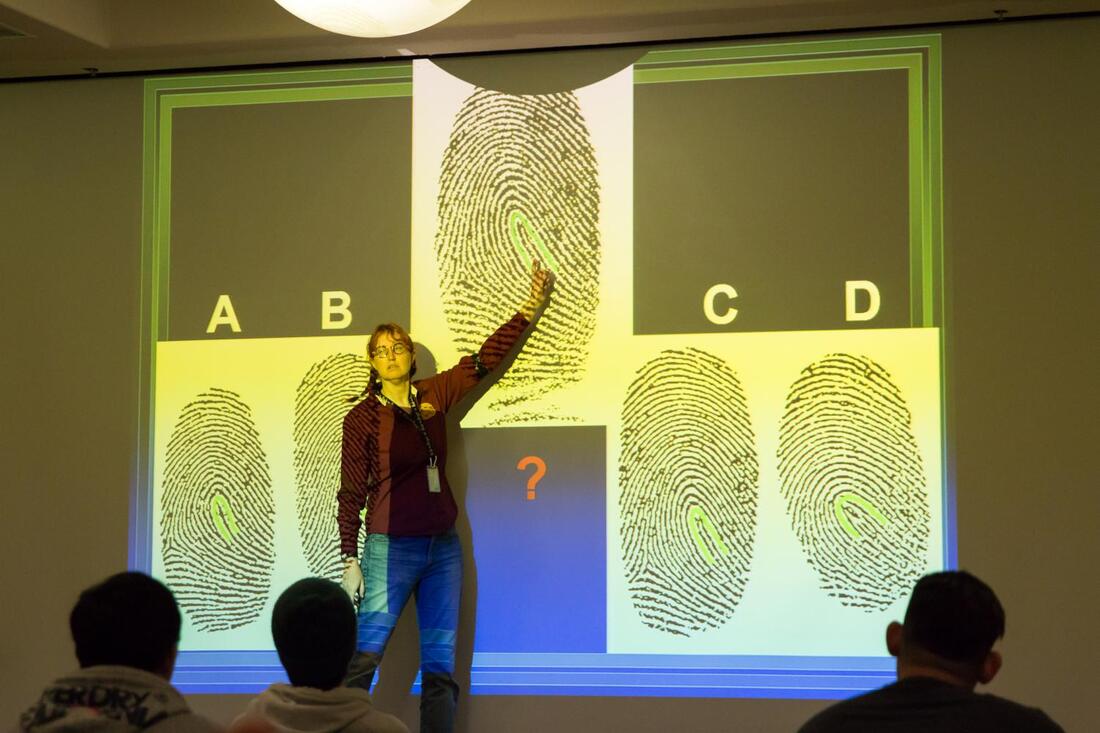Cordelia Willis, Criminalist
Got a question for Cordelia or another STEM professional? Ask away on our Captain STEM Forum >
|
Cordelia Willis is a Criminalist (perhaps better known as a Forensic Scientist) at a Crime Lab for the County where she resides. As a Criminalist, Willis carefully collects evidence from crime scenes of criminal cases then analyzes the evidence in a lab, takes notes about the tests she performs, writes reports detailing her conclusions, and ultimately testifies in court about her findings.
|
Education
|
Bachelors in Math and Music Theatre (double-major)
Bachelors in Forensic Science* Masters in Statistics |
How did you end up in this role?
|
My biggest struggle was with figuring out what I wanted to do. I enjoyed and was good at a variety of things, but I didn't know how to translate that into a career (or a life). You can see by my career trajectory below that it took me a long time to figure out what I wanted to do.
My background was not typical. To work at most crime labs, you just need a 4-year degree in science; however, I ended up getting two masters degrees before starting in my job at the crime lab. My undergraduate degree was a double major in Math and Music Theatre because I liked both and didn't want to choose one over another. After I got my degree, I had no idea how to turn my education into a career so I decided to continue with my education. My father (who had been a high school science teacher my whole life) was working on his doctorate in science education and thought I'd enjoy statistics (which he'd had to study as part of his advanced degree). Having never taken a statistics class in my life, I decided to get a masters degree in it!! Luckily my dad was right and I did enjoy it. And while a degree in statistics can translate into many jobs, I wasn't really interested in any of them. I had taught college math classes part-time while I was getting my degree and taught classes full time at the university for a year after I graduated, but the contract was only for one year so I knew I would have to find something else. I went to a career event at my college and met the director of a private school. He was excited about my varied background and hired me to teach math and science to middle schoolers (where I also coached basketball and assisted with the theatre program). While I enjoyed the students, I was being harassed by one of the parents; because of this I essentially had a nervous breakdown and spent every night hyperventilating and crying hysterically because I felt I couldn't do anything right and was trapped. I finally started seeing a therapist who put me on anti-anxiety medication which magically made me feel like my old self again, able to make decisions. During this time I was addicted to the TV show The X-Files, which was about FBI agents hunting down aliens from outer space. One of the main characters was a medical doctor who was often doing autopsies, and I became really fascinated by this kind of work. I saw that the local community college was offering a class on pathology; every Thursday night the teacher would spend three hours showing us slides of dead bodies and crime scenes. While most people ended up dropping out of the class, I realized I was really skilled at noticing details and putting clues together. After I started on the anti-anxiety medicine, I suddenly realized that I could go back to college and study forensic science. Thus, at the age of 28, I finally knew what I wanted to do as a career! However, because my college background was in math and not science, I had a lot of basic science classes that I needed to take before starting my forensic degree. So I continued to teach at the middle school for another year while I took science classes at the local college in the evenings and during the summer. "I realized I was really skilled at noticing details and putting clues together."
I then went back to school again, this time to get a masters degree in forensic science. I also did two internships while I was studying: one was for the local crime lab, where I did studies on new DNA testing techniques, and one was for the NCIS Cold Case Squad, where I got to read old case files and suggest what new forensic tests could be performed to help solve the cases. After I got my degree, I ended up having to make a decision between two jobs: NCIS and a crime lab in California. With the NCIS job I would've had to be an agent (essentially a cop) for several years before I could even apply to work in a lab, and in the meantime they could station me anywhere, including on an aircraft carrier in the middle of the sea. So I decided that the crime lab was a better place for me and took that job, and I've worked there for the past 22 years.
"Just because you don't choose a career in a particular field doesn't mean you can't still make it a part of your life."
And remember how one of my college majors was music theatre? Well, just because you don't choose a career in a particular field doesn't mean you can't still make it a part of your life. During the years I have belonged to various choirs, written and directed children's plays at my Unitarian church, and performed in community theatre productions of shows like Les Miserables, Chicago, and Mamma Mia. In addition, because of my background in teaching, I now run our CSI training program and do outreach to schools about forensic science. So just because you choose one career, it doesn't mean you have to leave your other desires behind.
|
A day in the life
|
The role of a criminalist can vary a great deal. These days, I compare shoe prints and tire tracks, analyze bloodstain patterns, process audio and video files, and download data from cell phones. In the past I've tested powders for drugs, processed items for fingerprints, worked with the national DNA crime database, and examined evidence for biological stains would could be tested for DNA.
Most of our work is done in the lab, but I am also on the crime scene team, where we go to the actual crime scene, take photographs, look for evidence, and spray chemicals to detect blood that has been cleaned up. (Yes, sometimes the body is still there.) I also train law enforcement officers (such as the police) in crime scene processing so that they can do a better job of documenting and collecting evidence when we aren't there to help. |
Advice for aspiring students
|
Watching TV shows about crime doesn't necessarily mean you would make a good forensic scientist. As the name implies, we are scientists, so you need to have a solid background in science. Many people think a degree in criminal justice will allow them to work at a crime lab, but it is not sufficient to become a forensic scientist because you need to take science courses with labs to qualify. And while there are undergraduate degrees in forensic science itself, I would actually recommend you major in chemistry or biochemistry; a strong background in these areas will allow you to work in almost any area of forensics and will qualify you for positions outside of forensics as well, in case you can't find a job at a crime lab or decide you don't like working in one.
I also recommend working on your writing and public speaking skills. As a forensic scientist, you will need to write reports and testify in court about your findings. Communicating your forensic conclusions is an important part of what we do, so you need to work on your communication skills. Also, you should learn about photography. Photos are taken in almost all areas of forensics, and you need to be able to know how to work a "real" camera (with shutter speeds and f-stops). Many community colleges offer classes in basic photography, and I highly recommend these because it is an important skill for forensic scientists to have. Finally, being a forensic scientist means having to deal with actual crimes. It's one thing to watch TV shows where fictional people do horrible things to each other, but it's another to realize that there are real victims who have suffered. Some people can't handle the reality of it, and if that's you, that's okay. As for me, I always knew that bad people were out there, and I feel like my job allows me to fight against that evil, helping to put the bad guys away and let the innocent go free. |


